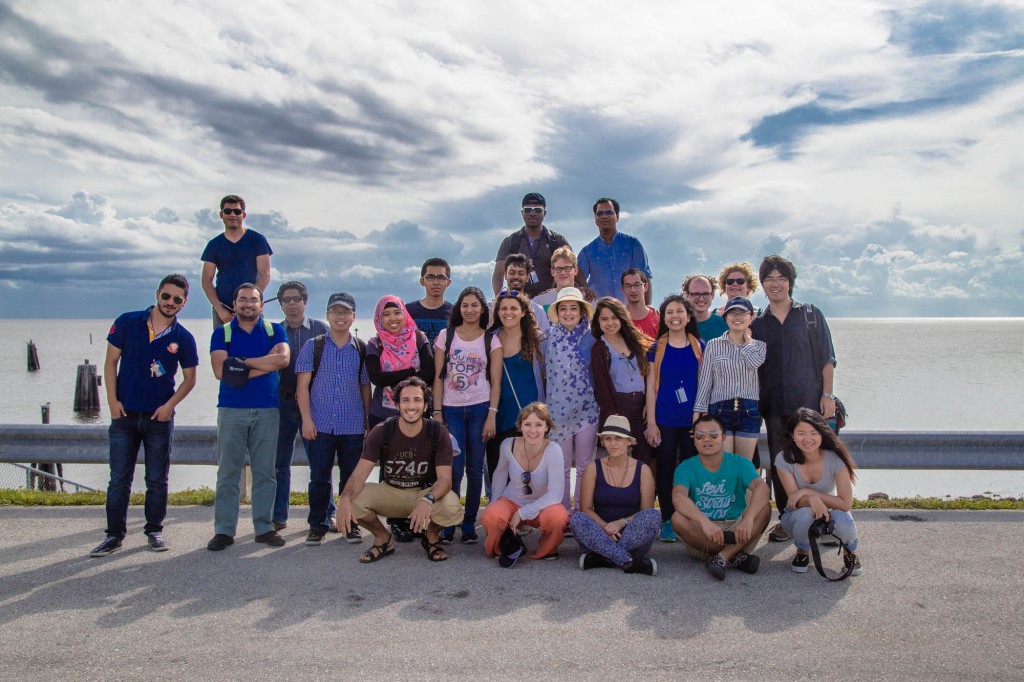 by Jaclyn Brass
by Jaclyn Brass
On May 20, 2015, 26 students from 15 countries landed in West Palm Beach to learn about Florida’s water management practices and restoration in the 10th anniversary of the UNESCO-IHE Florida Program, an education-based collaboration between the UN and Florida Earth Foundation (www.floridaearth.org).
The students, called the “Water Ambassadors,” are pursuing their masters and doctoral degrees in hydro-informatics and flood risk management at UNESCO-IHE, the UN’s water institute for graduate studies located in Delft, Netherlands.
Students spend more than two weeks in Florida studying computer models developed for the Everglades Restoration Program, and they take that knowledge back to their home countries.
“In essence, these students are studying to help solve water problems throughout the world,” said Stan Bronson, Executive Director of Florida Earth Foundation, a not-for-profit focused on unbiased knowledge sharing that runs the program with the help of donations from the community.
“The students at UNESCO-IHE represent some of the brightest minds in the world,” Bronson continued. “They are a group of around 200 students chosen from between 2,000 and 5,000 applicants after rigorous testing.”
Companies, organizations and individuals have the opportunity to help fund the program through a social media crowdfunding campaign at www.crowdrise.com/thewaterambassadors; all donations go toward the cost of running the program.
Coming from countries including Bangladesh, Indonesia, Iran and Bosnia, the Water Ambassadors face every imaginable water problem in their home countries. They are dedicated to keeping people safe while finding the balance between nature and civilization.
The Water Ambassadors visited the Big Cypress Seminole Reservation, the Everglades, Kissimmee River and Lake Okeechobee, and they spent several days with both the South Florida Water Management District and the US Geological Survey in technical classes taught by ecologists and engineers.
“This program offers a unique opportunity for our students to realize the importance of modeling in multidisciplinary water management,” said Leonardo Alfonso, who was a student on the trip 10 years ago and is now one of the professors that accompanies the students each year.
“Water systems are complex to manage anywhere in the world because they have multiple conflicting water users and interests,” Alfonso continued, “The exposure to good ideas that became successful, as well as those that were unsuccessful are transferred to the students, who carry these messages to their countries and make a global impact in the world of water management.”
The program has brought 220 students from 48 countries to Florida, most of whom had never been to the United States before.
Students learn about the world’s largest restoration project and the importance of integrating stakeholders, but, according to one fan of the program, the real value lies in the exposure that local communities get to different cultures:
“This project is fabulous on so many levels: social and intellectual exchange, economic benefits for the ambassadors and their countries, and growth in understanding the importance of person-to-person contact,” said Kathe Thompson.
“If you donate a few dollars to these students, it might change their lives; if you meet them in person, it might change yours,” added Florida Earth Foundation board member Keith Rizzardi.
To learn more or help create water solutions, visit www.crowdrise.com/thewaterambassadors.

It is an great experience in America!!!!! We really learned a lot during the field trip.
nice article, good to know great minds are working together!